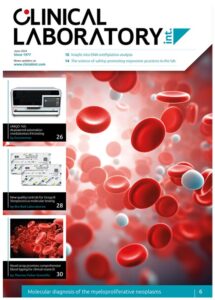Progress in the management of prostate cancer
Although globally prostate cancer (PCa) is the second most common cancer in men after lung cancer, and around one in six men in the West will eventually be diagnosed with the disease, the majority of these patients will die of unrelated causes. Thus PCa management should ideally not only involve diagnosis and provision of the most appropriate therapy, but also a decision as to whether any treatment is actually necessary.
Traditional screening based on an elevated level (above 4ng/mL) of the far from specific marker Prostate Specific Antigen (PSA) to diagnose PCa has led to over-diagnosis, unnecessary biopsies and over-treatment. It has also led to PCa cases with PSA levels below the cut-off value remaining undetected. The phi test, available in Europe since 2010 and very recently approved by the FDA, was developed to improve prostate cancer management. Intended for use in men with a PSA level in the range of 4 – 10 ng/mL, the test combines measurements of total PSA, free PSA and an isoform of free PSA, namely [-2]pro-PSA, to determine the probability of prostate cancer. The test does help to discriminate between PCa and benign disease, and reduces the number of negative prostate biopsies.
However many elderly men diagnosed with a tumour confined to the prostate gland that would not have affected their survival are still undergoing aggressive and unnecessary therapy; the majority of these patients suffer from erectile dysfunction after treatment and many have urinary leakage and intestinal problems. There is still a major need for accurate, preferably blood tests to determine which elderly patients with PCa currently confined to the prostate gland are likely to suffer eventually from life-threatening metastatic prostate cancer.
Two papers published in the October issue of The Lancet Oncology give cause for optimism, however. It was found that whole blood gene profiling in men with metastatic castration-resistant prostate cancer (defined as disease progression despite androgen depletion therapy) was able to stratify patients into two distinct prognostic groups. In addition the European Medicines Agency (EMA) is about to approve a new drug, Enzalutamide, to be taken orally once a day, for the treatment of metastatic castration-resistant prostate cancer. Data from Phase III clinical trials show that as well as extending life in sufferers, the drug also improves quality of life by reducing pain and increasing appetite and energy levels.
Hopefully at least some of the unnecessary suffering resulting from PCa management will soon be alleviated.



